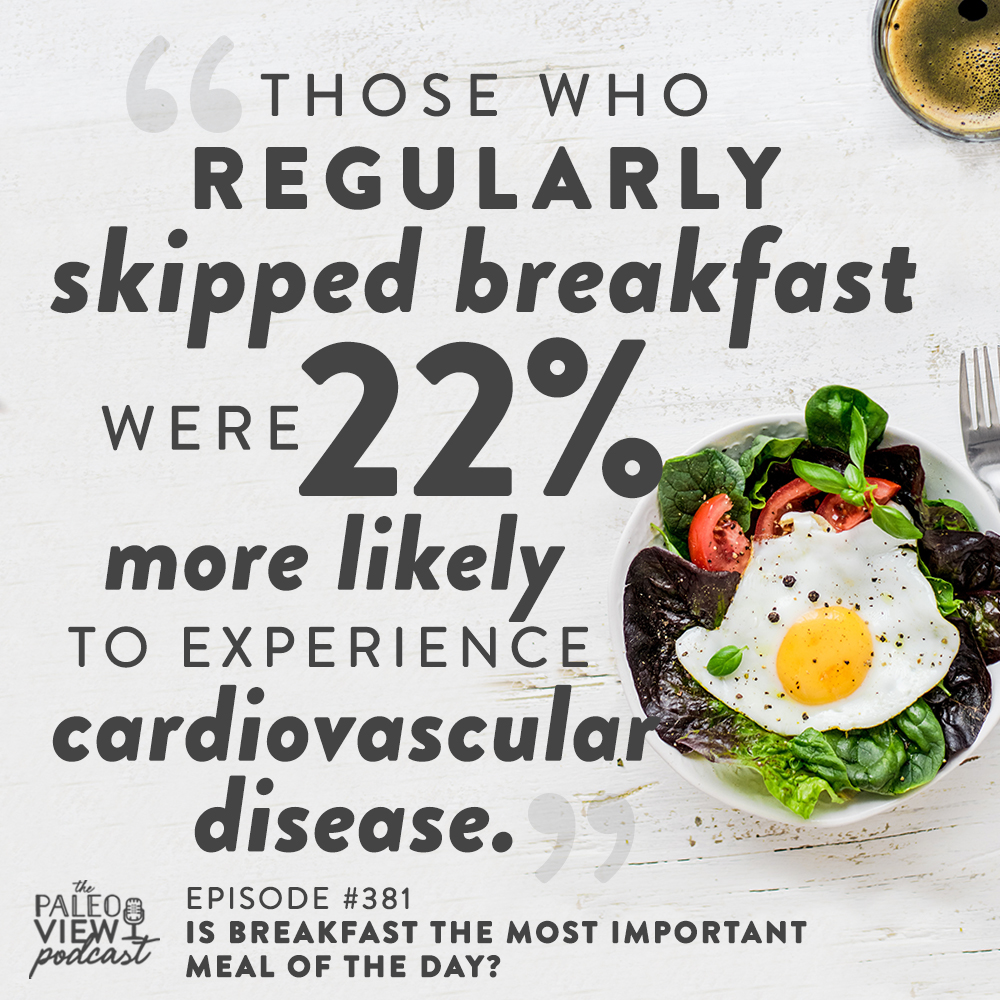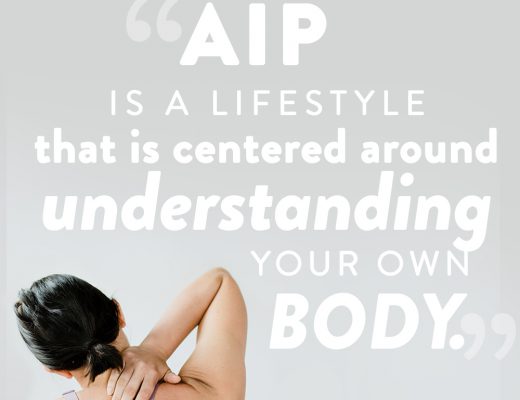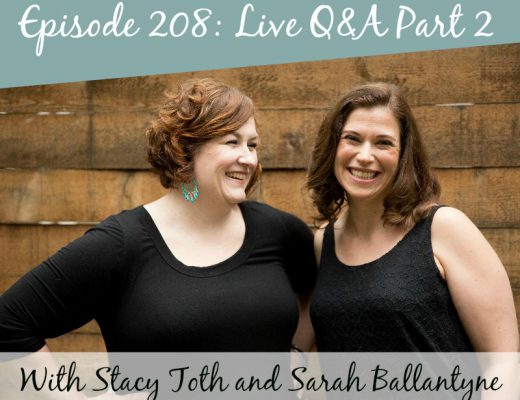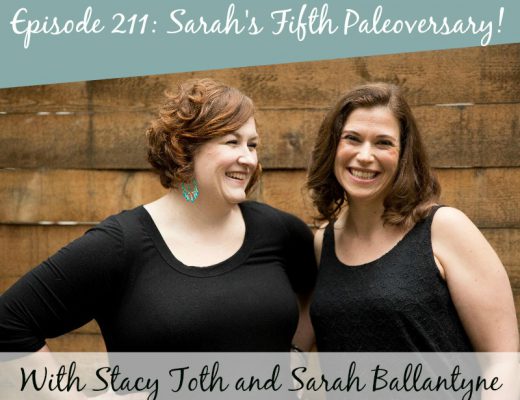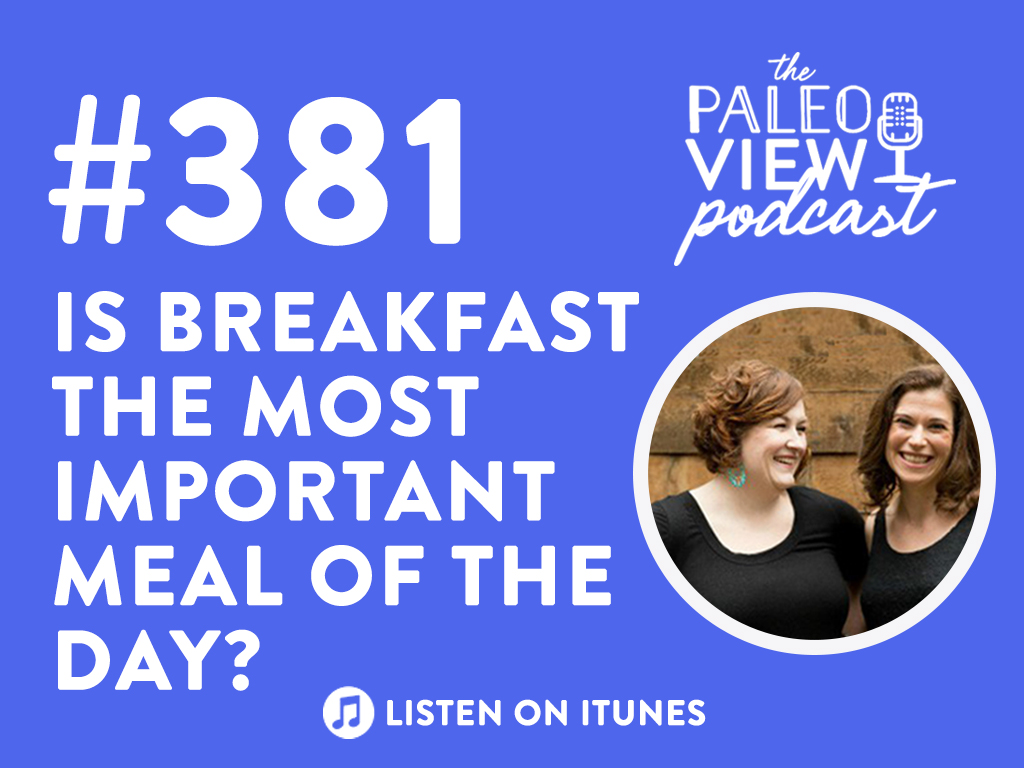
On this week’s show, Stacy and Sarah address a listener’s question, which is a question that has been asked by many for ages. Is breakfast the most important meal of the day? Tune in below for the science behind meal timing and caloric intake, tips on the ideal breakfast, and more. Enjoy!
If you enjoy the show, please review it on iTunes!
The Paleo View (TPV), Episode 381: Is Breakfast the Most Important Meal of the Day?
Welcome back to episode 381! (0:40)
This is the episode where Stacy’s heart will be broken as they discuss if breakfast is the most important meal of the day.
Before diving in, Stacy wants to lay the groundwork and stress the importance of bio-individuality.
Stacy doesn’t have a gallbladder and she has learned that breakfast is very difficult for her in the morning.
Through trial and error, she has learned how to boost her digestion and get things going so that she can eat an early lunch.
However, she would love to know how to improve this situation for herself personally.
This show was inspired by a listener’s question and this is a topic that Sarah has blogged about before and is excited to discuss here as well.
The effect of eating in the morning is tangentially looking at intermitting fasting research.
Not to spoil the conclusion of the show, but after digging into the latest research – yes, breakfast is really important.
Sarah naturally leans towards sumo dieting.
This is an eating pattern where you load the majority of your eating towards the later part of the day.
Sarah has to be intentional about eating breakfast because of this tendency.
Over the years, Sarah has seen that her lack of interest in food in the morning correlates with stress.
Q & A
Here is the listener’s question (7:24):
Hey ladies! I so look forward to tuning in each week to listen in on your conversations, thank you for all the work you both do to educate us!
I guess I’m a long-time listener, first-time caller.
Here’s my question, how important is it to eat breakfast?
I am usually up and out of bed by 7 am, coffee in hand by 7:15, but I don’t get hungry until 11 am.
Then I am a grazer until about 3 pm, dinner is around 7 pm and I am in bed by 8:30 pm, asleep about an hour later.
Sarah, I do take your sleep advice very seriously and I have made sleep my top priority.
I would really like to drop about 15 lbs and I am willing to make a shift in when I eat if that would help.
Am I missing out on important health benefits by skipping breakfast?
The short answer is yes, it appears as though breakfast is a really important metabolic control.
This relates to both the hormones that are required to supply our body with energy in the morning and also some hormonal programming that is impacted through the day.
There have been a variety of research done over the last 10-15 years on skipping breakfast.
A lot of this research showed correlative results, not causation.
In the last five years, there have been some really well-designed crossover trials.
Sarah explained this study design in greater detail.
The Research
There have been some studies that are starting to show that regularly skipping breakfast does negatively impact metabolism. (10:55)
This is in the context of an increased risk of metabolic syndrome.
As we look at the data, what is really interesting is that regardless of the group of people you select, there are measurable problems with skipping breakfast.
For example, there was a study done on healthy lean women where they ate three meals a day for two weeks straight, or they skipped breakfast for two weeks straight.
Some of these studies the caloric intake is controlled, in this study, it wasn’t.
In this particular study, neither group lost weight.
However, in the group that skipped breakfast, they had reduced insulin sensitivity, they tended to eat more, and they were getting unfavorable fasting lipids.
Other studies that looked at overweight and obese participants and the impact of shifting their highest calorie meal to breakfast.
This shift improved their fasting glucose and insulin sensitivity, lowered triglycerides, and they experienced weight loss.
Additional Studies
There have been a variety of other studies that have looked at when you skip breakfast you have a higher glycemic response to the same meal at lunch.
Studies that have shown that women and men who skip breakfast will be more insulin resistant later in the day.
There is also an impact on cortisol and sex hormones.
A metanalysis was assembled on people who routinely skip breakfast and their risk for developing type-2 diabetes.
Even after adjusting for BMI, you are 22% more likely to develop diabetes if you regularly skip breakfast.
There was another meta-analysis looking at men and women over forty.
The study compared people who regularly skip breakfast versus people who eat three meals a day on a regular basis.
Those who regularly skipped breakfast were 22% more likely to experience cardiovascular disease and die from it.
The all-cause mortality in that study showed that skipping breakfast resulted in a 32% higher all-cause mortality.
These numbers really surprised Sarah because of the high magnitude of the effect.
Breakfast is programming our metabolism.
This includes how we are processing fats and how we are processing carbohydrates.
Whether or not we eat breakfast impacts our blood lipids, glucose response, and insulin sensitivity for the rest of the day.
Now there are studies that are starting to get more nitty-gritty, controlling more factors. (16:57)
In another study there were three groups that either had three meals a day, they skipped breakfast, or they skipped dinner.
Everything in this study was controlled.
They found, that if you skipped a meal you did have a little higher energy expenditure.
When the participants skipped breakfast, they also had higher inflammation and impaired blood sugar response.
All of these metabolic effects were not related to skipping a meal but were related to skipping breakfast versus dinner.
The study made an argument that if you are going to do intermittent fasting, have your feeding window earlier in the day.
Food is more thermogenic in the morning compared to the evening.
There is a stress piece to all of this.
People who are stressed are more likely to skip breakfast, which is a symptom of things not being great.
However, skipping breakfast drives cortisol dysregulation, caused by chronic stress, which makes the person not want to eat breakfast.
Sarah found one study that showed that adolescents were 44% more likely to eat breakfast if they got enough sleep.
The Habit Connection
We know that sleep is really important for regulating metabolism, and not getting enough sleep increases the risk of obesity.
Good habits tend to go together, and bad habits tend to compound as well.
If you don’t get enough sleep, your at higher risk of developing type-2 diabetes, and you are also at higher risk of not eating breakfast, which will increase your risk of type-2 diabetes.
As you pull the threads it is easy to see where you can have these snowball effects in terms of your lifestyle choices.
Eating breakfast that includes a high-quality protein is really important for programming our metabolism, insulin, cortisol, and sex hormones throughout the day.
We are more likely to consume breakfast if we are getting enough sleep and regulating our stress.
These habits feed into each other.
Sarah finds this reality to be empowering because as she makes choices, no one choice feels really hard because it feeds into other choices.
Stacy shared a bit on the conflicting information she has heard over the years surrounding intermittent fasting.
There are a few key details to pull away from the studies regarding the ideal breakfast.
The calories in your breakfast, 20 to 30% should contain protein.
There have been studies showing that even higher protein breakfasts are more beneficial for metabolism, leaning towards 40 to 50% at breakfast only.
Sarah defined breakfast as 350 to 600 calories, with the goal to aim for that middle range.
Stacy noted that what works for her is to have a collagen veggie smoothie with coffee and half a banana.
Since she doesn’t have a gallbladder, she drinks this slowly and paces it out, and it does help to get her digestive system up and running in the morning.
Sarah took a moment to remind everyone what Gallbladder disease is since it is very common. (36:05)
Stacy shared more on how she balances everything out and why she has to be mindful around her choices.
It is important to understand what works best for your body so that you can set yourself up for success.
Closing Thoughts
One of the things that the autoimmune protocol did for Sarah was to break the association that certain foods are breakfast foods.
She no longer thinks that eggs, bacon, cereal, and bagels are standard breakfast foods.
Now, Sarah thinks that anything she can get that is quick and healthy counts. (43:07)
For a long time, Sarah has relied on leftovers for breakfast.
Sarah also has a variety of sausage recipes in her books and on her site, which she preps in batches.
Stacy and Sarah are both huge fans of soups for breakfast as well.
Check out these broth resources (here and here).
Since breakfast isn’t something that is easy for Sarah to get in, she set up an assembly line to batch prep smoothies.
The big takeaway that Sarah wants for the Paleo View listeners is to understand that forming the habit to consume breakfast is worth it.
You can make a smoothie, grab Chomps sticks or Wild Zora with a piece of fruit, or have leftovers from the night before.
You can find a way to get healthy food in your body first thing in the morning.
It should be a meal that doesn’t require work that sets you up for the day.
Breakfast should be a part of every day.
Stacy and Sarah will share their breakfasts on social media, and feel free to do the same and tag them to share the inspiration.
We are great at taking care of others (like our children and spouse) but don’t forget to take care and feed yourself as well.
Stacy and Sarah will be back again next week with a topic that Stacy is super excited about.
They have planned out their podcast schedule for the next five weeks, and look forward to sharing the topics that often come up around the holidays.
Thanks for listening!
If you have follow up questions please feel free to submit them through the contact forms on Stacy and Sarah’s sites.
As always, Stacy and Sarah also love to connect with listeners on social media as well!
Thanks for listening! (53:58)
